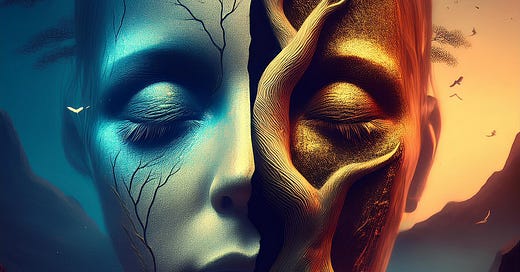Generally, I keep my private life offline, and my writing usually centres around my opinion of things with the occasional citation to back it. Admittedly, I am nervous about publishing this first, very personal piece, but someone might find value in this encounter I had earlier today.
I needed a panel of blood tests done today, and as the phlebotomist prepped my arm, she (obviously) noticed the scarring around the good veins. With a raised eyebrow and a disapproving look, she gestured towards the scars and cleared her throat. I responded casually, “Oh, right. Inurement scars.”
Tilting her head slightly and narrowing her eyes even more, she echoed softly, “Inurement scars?”
Remaining upbeat and open, I decided to lay all my shit bare:
You see, I was born in the mid-eighties to a young, white Afrikaans couple who had married two years prior and taken every precaution to avoid pregnancy. You could say I’m part of the 1–2% of failed copper-T babies. My father, who exhibits strong narcissistic tendencies and is easily triggered, was thrust into a small flat with a colicky baby—a situation that didn’t exactly pacify his temperament. Combined with the fact that my mother never wanted children, this left her emotionally exhausted and unable to bond with me. Hence, I grew up with abandonment, self-worth, and attachment issues.
My father, fresh from the field as a reconnaissance soldier during apartheid South Africa, was haunted by the atrocities he committed under his government’s orders. His symptoms of PTSD, exacerbated by frequent and excessive alcohol consumption, were inflicted upon my mother and me. My mother, petite and skinny as a rake, occasionally found her size advantageous. Not many adult women can escape—along with a two-year-old—through the burglar bars of a nursery while their husband opens a safe to retrieve a firearm.
One might imagine that a child would be deeply disturbed after witnessing their beloved toy Pomeranian’s throat being slit or their father getting arrested. The fact that I was never placed in the system, even after Mom shot Dad, remains a mystery. But it wasn’t all bad. My grandmother and godmother doted on me and spoiled me rotten. Her sons, however, disapproved and attempted to kill me once or twice, but, you know, boys will be boys—they didn’t mean any harm.
Subconsciously, though, I always knew the truth: I was the problem. It was all my fault. That’s not a very nice feeling, especially for a child. At 12, I was introduced to a solution—a survival mechanism—something that helped me make it through school. Did you know I passed Grade 12 with six A’s and one B? It gave me confidence, helped me make friends, and inspired me to write and explore spirituality. It served as a catalyst for self-exploration and emancipation, facilitated deep friendships, and left me with many weird, wonderful, and terrifying stories to tell today.
So, yes, these are inurement scars. I accumulated them over 20-odd years using 30G insulin needles to feel something—anything—other than myself. They were my way of coping with childhood adversity and violence so I could get on with my life. Maladaptive as it sounds, I’m not ashamed of these scars. Without them, I probably wouldn’t have survived this long.
It was obvious that the over-share caught the phlebotomist off guard, and I commend her professionalism. By the time I finished talking, she had filled the nine required vials with blood and stuck the cotton ball to the tiny puncture wound with a band-aid. She held the open glass jar offering me a lollipop and a warm smile. “Inurement scars... I’ve never heard that term before. Thank you for sharing that with me. You’ve given me something to think about.” And escorted me back to reception.
It’s worth mentioning that I usually wear my scars under my sleeve—figuratively and literally. When I was younger, I didn’t give them much thought, nor did I care about others’ opinions. But as I’ve grown older, I’ve become acutely aware of them and the unfair treatment and judgement they often invite. I can live with that. What I cannot live with, however—and the reason I hesitate to share personal experiences online—is the fact that my son faces judgment and unfair treatment because of my scars.
This is why it’s so important to challenge stigma, extend compassion, and shift the narrative surrounding visible and invisible wounds alike. Our scars—whether on our skin or souls—tell stories of survival, strength, and potential transformation. Do not underestimate the question: “what happened to you?”.






